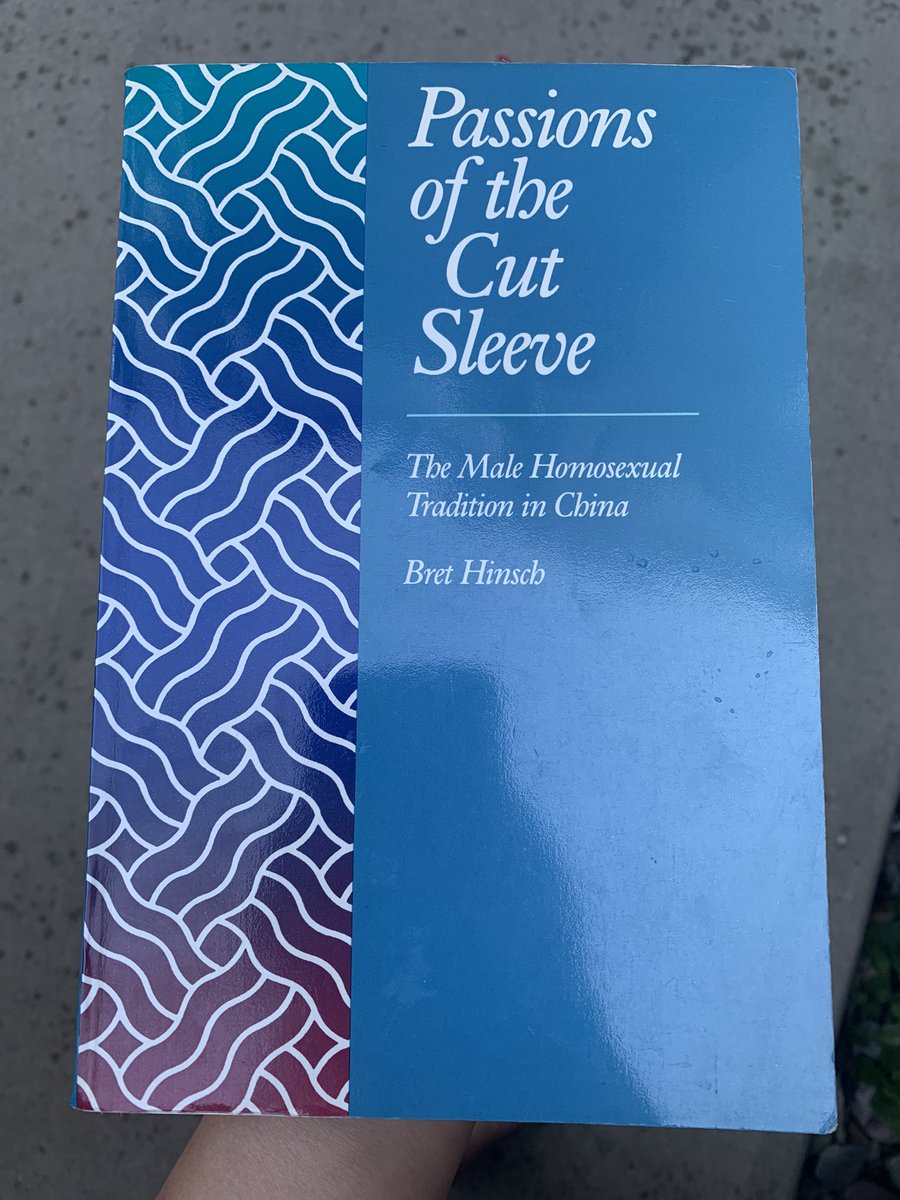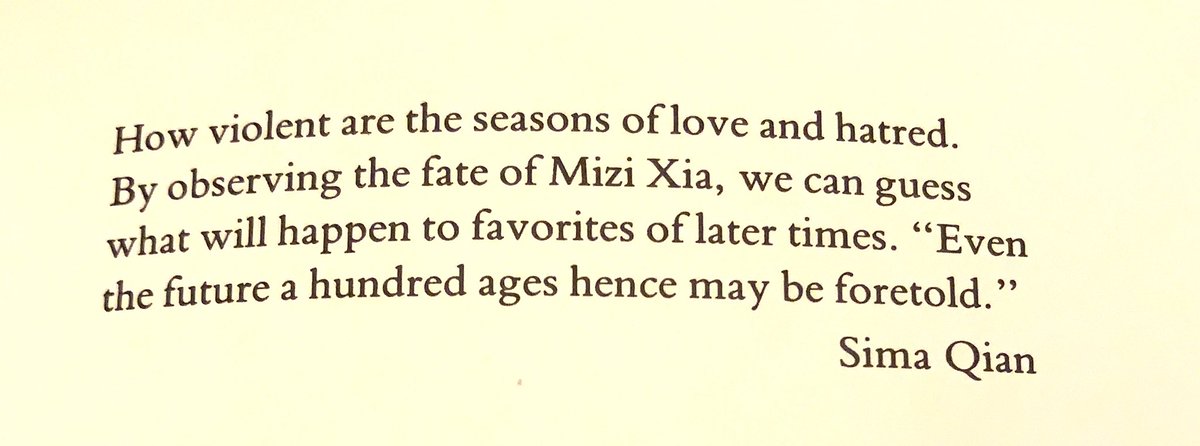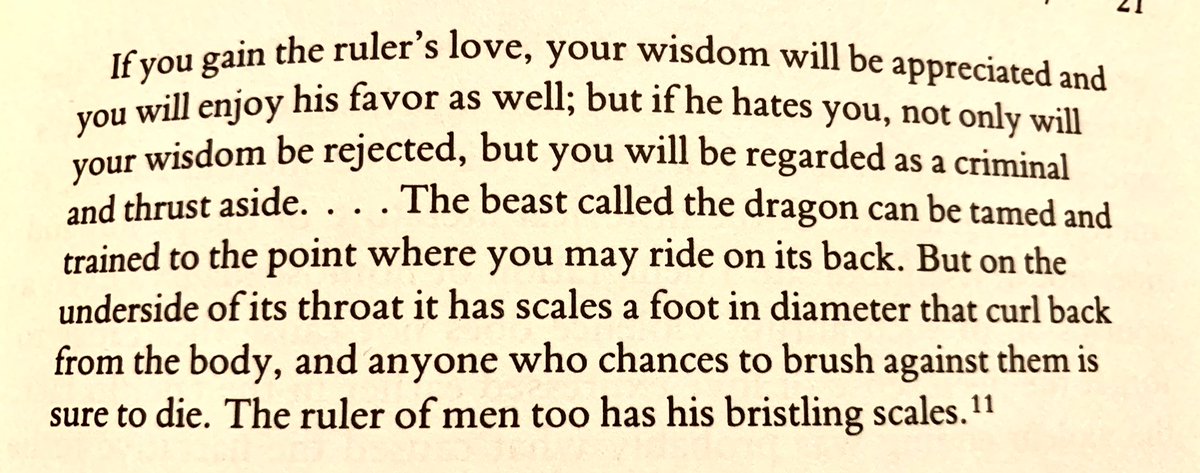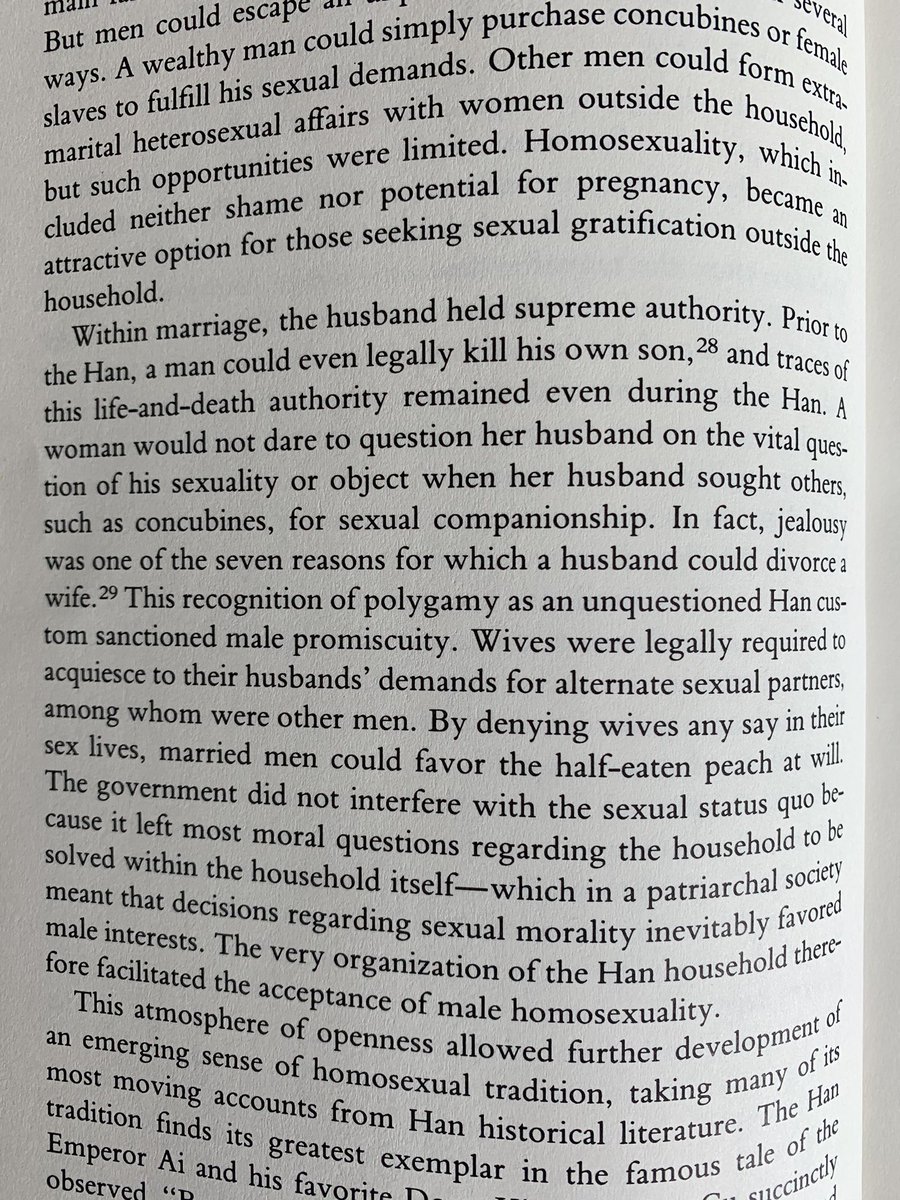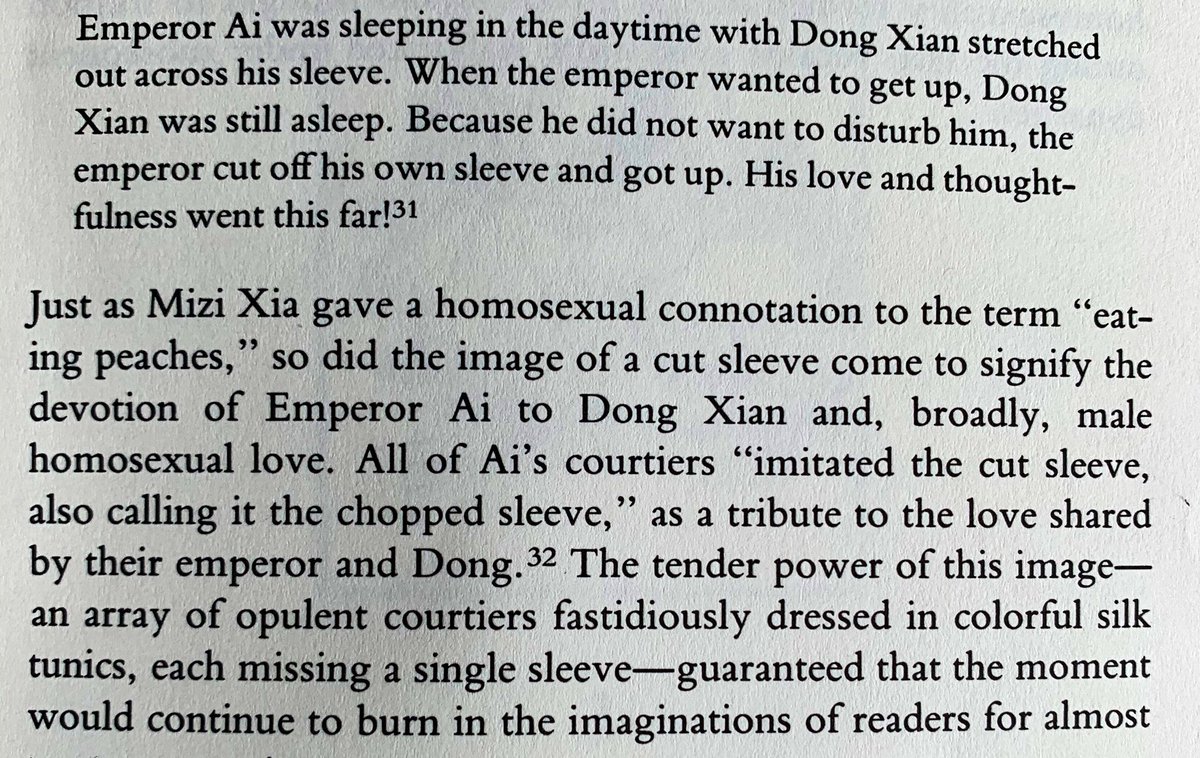staring off with some real good stuff about western observers being horrified by the ubiquity of male homosexuality in 16th century China. and good stuff about why he’s undertaken this work, the Chinese distinction between male and female homosexuality. #qgjp
page 6-7 note about the paucity of materials on homosexual women, including the comment that “Chinese literature was almost always written by men for men”
page 7 also dives head-on into the discussion of whether traditional cn culture conceptualization of homosexuality — #qgjp
page 7 also dives head-on into the discussion of whether traditional cn culture conceptualization of homosexuality — #qgjp
points out that instead of having a medical or scientific term like “homosexuality” or “homosexual,” CN tradition uses poetic metaphors referring to earlier men or incidents associated with homosexuality, as well as social position — “favorites”, what a man enjoys & does #qgjp
page 8 mentions that in surviving literature, anal sex is the most frequently mentioned explicit sexual activity w/intercrural, mutual masturbation, fellatio, everything else relatively rare #qgjp
page 9 starts talking about how traditional CN culture handled top/bottom discourse — dominance and submission, active versus passive in male/male sexual relations, w/ dominance being primarily tied to social standing #qgjp
and the partner with higher social status usually taking the active role, though there is suggestion that in the same way age played an element w/younger men expecting to be penetrated by penises. Institutionalization of male prostitution by boys and actors helped solidify #qgjp
sexual roles.
Page 12 brings up Greenberg’s famous typology of homosexuality outside the modern West — Hinsch says CN homosexuality was generally trans-generational (older partner takes active role, younger partner takes passive role) and class-structured (sex work, #qgjp
Page 12 brings up Greenberg’s famous typology of homosexuality outside the modern West — Hinsch says CN homosexuality was generally trans-generational (older partner takes active role, younger partner takes passive role) and class-structured (sex work, #qgjp
imperial favorites, me sniggering in NMJ over the description of rulers lavishing offices and titles on “beloved courtiers”). Some trans-gendral homosexuality, but primarily in the form of male actors who played female roles. Hinsch also puts into this cat. eunuchs who #qgjp
engaged in relations with other men and men who took on gender identities as women.
He also finds egalitarian homosexuality — points out the adolescent love in Dream of Red Chanber, and discussion about CN tradition of deep friendship allowing for egalitarian homosexual #qgjp
He also finds egalitarian homosexuality — points out the adolescent love in Dream of Red Chanber, and discussion about CN tradition of deep friendship allowing for egalitarian homosexual #qgjp
relationships, both among the literati and the laboring classes.
interesting to sort the basically-canon ships from cql into these categories — w*ngxian as essentially egalitarian due to lwj and wwx having roughly equivalent social standing, same as sl/xxc #qgjp
interesting to sort the basically-canon ships from cql into these categories — w*ngxian as essentially egalitarian due to lwj and wwx having roughly equivalent social standing, same as sl/xxc #qgjp
n*eyao ad being trans-generational and class-structured with both models pushing towards a nmj dominant-active and my submissive-passive
X*yao having the potential to be that way, but lxc’s comment re: them being the same bei-zi and the repeated bow/catching, coming down #qgjp
X*yao having the potential to be that way, but lxc’s comment re: them being the same bei-zi and the repeated bow/catching, coming down #qgjp
steps pushing towards an egalitarian model, but is it? is it really?
two photos to close out liveblog of introduction, last paragraph of said intro and the epigraph first the whole book.
two photos to close out liveblog of introduction, last paragraph of said intro and the epigraph first the whole book.
First = for #qgjp
For those playing along at home, the epigraph from Sima Qian that frames the book — Sima Qian is, by a crude way of putting it, the Herodotus of Chinese historiography. His style of writing hugely influential, so by using an epigraph from him, I read Hinsch as throwing #qgjp
down a little, especially with that epic quote — you just TRY and tell me this isn’t a subject worthy of a book. #qgjp
Into first chapter now — I really love Hinsch’s writing eith a discussion of the gender-unspecified “mei ren” (beautiful person) from the Shijing (Classic of Odes)
I’m just saying that Xichen has recited this to Jin Guangyao to remind him of how they first met: #qgjp
I’m just saying that Xichen has recited this to Jin Guangyao to remind him of how they first met: #qgjp
Xiyao not getting left out either — I can’t take a photo because the shadows are terrible, but it’s this whole poem about a man speaking to his fellow to reassure him about going off to war
how can you say that you have no clothes?
I will share mine with you. #qgjp
how can you say that you have no clothes?
I will share mine with you. #qgjp
it’s so deeply them — MY reciting it to Xichen to give him heart during the worst of being on the run, to the point that I can imagine the list of nouns the poem talks about being shared between the men being one of the tipoffs to lxc about who writes the sunshot letters #qgjp
That’s Han Fei, the legalist scholar, writing about the downfall of Mizi Xia. Hintsch doesn’t read HF as being as hard on MX as other commentators do, thinks HF is generally sympathetic to MX and that the downfall was due to the Duke’s fickleness afte MX’s looks faded. #qgjp
Hinsch has a blurb about Pan Zhang and Want Zhongxian and ahahaha lookit this Wikipedia shade (and summary of the story):
https://en.m.wikipedia.org/wiki/Pan_Zhang_%26_Wang_Zhongxian
#qgjp
https://en.m.wikipedia.org/wiki/Pan_Zhang_%26_Wang_Zhongxian
#qgjp
Hinsch has a discussion about how mei in modern times is only used to describe female beauty, but in ancient texts, was used to describe both male and female beauty with a connotation of internal beauty/goodness
LET LAN XICHEN CALL A-YAO “MEI”
[bangs pots and pans] #qgjp
LET LAN XICHEN CALL A-YAO “MEI”
[bangs pots and pans] #qgjp
Hinsch comments on the impermanence of “favorite” status — a king on his deathbed sends his favorite to the court of a rival king to protect him from the machinations that will follow his death, and notes that male favorites didn’t share the graves of rulers because it #qgjp
“would have been an extraordinary act, suggesting status comparable to that of a consort.”
Chinese saying that Hinsch relays: “A beautiful lad can ruin an older head; a beautiful woman can tangle a tongue.” #qgjp
Chinese saying that Hinsch relays: “A beautiful lad can ruin an older head; a beautiful woman can tangle a tongue.” #qgjp
Bottom line for Hinsch in the Zhou: male homosexuality “simply part of the broad range of sexual expression” in this era for the political elite, wi th moralists complaining only when good looks influenced political decisions. #qgjp
"Marriage was seen as the bonding of two lineage groups, not the romantic union of two individuals. With romance banished from marriage, a husband was free to look elsewhere for romantic love and satisfying sex. Even in the ancient period, we see men who maintained a #qgjp
heterosexual marriage and a homosexual romance without apparently seeing any contradiction between the two. Since this seeming sexual dichotomy between duty and pleasure resulted from the kinship-based tradition, it would survive as long as kinship continued to provide the #qgjp
the foundation for social structure."
Also, a real interesting bit about how homosexuality in ancient China focuses "on relationships rather than psychological essence."
Hinsch says that instead of the term homosexual, texts use "chong," denoting a hierarchial #qgjp
Also, a real interesting bit about how homosexuality in ancient China focuses "on relationships rather than psychological essence."
Hinsch says that instead of the term homosexual, texts use "chong," denoting a hierarchial #qgjp
relationship of "regular patronage, or favor, bestowed by a superior on a man who happened to be a sexual partner.... it could also refer to heterosexual or nonsexual relationships; indeed, ancient texts even use chong in portraying 'respect' for the spirits." #qgjp
Onto the chapter on the Han dynasty, titled “Cut Sleeves at the Height it Fashion” where ten of the emperors during one of China’s all-time peak periods of prosperity and wealth were openly bisexual, including Deng Tong who was so favored that he was granted the right to #qgjp
mint copper money, but lost it all when his patron died because he had once humiliated the son who managed to ascend to the throne the point where he had to be rescued from abject poverty so deep he “was not left with so much as a pin to hold his cap on.” #qgjp
NHS HOLDING JGY’S HAT AT THE END RITE
When the emperor’s elder sister (!) gave Deng To g a gift of money, jt was seized by officials; she then gave him food and clothing as a loan, so it would not be seized, but he died as a “dependent in someone else’s home.” #qgjp
When the emperor’s elder sister (!) gave Deng To g a gift of money, jt was seized by officials; she then gave him food and clothing as a loan, so it would not be seized, but he died as a “dependent in someone else’s home.” #qgjp
Hinsch makes point that the son who ruined Deng didn’t do it because he disapproved of m/m relationships inherently —he had his own favorite, Zhou Ren whose AND I QUOTE FROM HINSCH HERE
“talents at the ‘secret games’ played in the imperial boudoir the emperors relished” #qgjp
“talents at the ‘secret games’ played in the imperial boudoir the emperors relished” #qgjp
Zhou Ren manages to stay on good terms with the dude who came after his guy, so his family got to stay prosperous and rich after his emperor died.
I’m into the meat of the chapter now, and it’s just. A lot. A LOT of stories about Han emperors enjoying good looking men. #qgjp
I’m into the meat of the chapter now, and it’s just. A lot. A LOT of stories about Han emperors enjoying good looking men. #qgjp
- Li Yannian, a eunuch who came to favor after the emperor made a concubine of Li's sister, and then decided he wanted to start having the brother too and then.... the emperor may have started banging Li's BROTHER, too????? #qgjp
- Zhao Zhang, another eunuch who had more feminine gender presentation
- Han Yan, who was an illegitimate grandson of nobility and studied writing with the future emperor and embodied many manly virtues, including the military strategy and was valued by the emperor as such #qgjp
- Han Yan, who was an illegitimate grandson of nobility and studied writing with the future emperor and embodied many manly virtues, including the military strategy and was valued by the emperor as such #qgjp
There's a whole fucking chart at the beginning of the chapter listing Han emperors and their male favorites, and it's a lot, even before we get to the most famous male favorite of the Han dynasty, Dong Xian, who was so beloved of the last emperor of the Western Han #qgjp
that Emperor Ai tried to have him declared emperor upon his death, because Ai never had sons. It did not work, alas, because the "bond between emperor and favorite was strong, but not strong enough to overcome the traditions of succession." #qgjp
Dong Xian had amassed too many political enemies and was forced to commit suicide. But Dong Xian is the dude that the cut-sleeve story is about -- Hinsch does the "Ai cut off his sleeve so he wouldn't wake Dong Xian" version, and talks about how #qgjp
the emperor would show up at Dong Xian's quarters and order him "to change into a light short-sleeved garment" that was made of "misty plan silk" that draped upon him like cicada wings, and "all" the courtiers of Ai's court started to wear the cicada wing garments w/one #qgjp
cut off.
Chapter also refs Qin Gong, a male slave who was beloved of a famous general who "openly maintained both a wife and a male favorite, a dual relationship that the social conventions of the time regarding marriage and slavery made possible" #qgjp
Chapter also refs Qin Gong, a male slave who was beloved of a famous general who "openly maintained both a wife and a male favorite, a dual relationship that the social conventions of the time regarding marriage and slavery made possible" #qgjp
AND THE WIFE APPARENTLY WANTED TO BANG QIN GONG TOO. And she wasn't alone in wanting her husband's lover?
Hinsch describes Huo Guang, who loved the slave Feng Zidu; HG died, "his widow, named Xian Guang, roamed playfully throughout the house together with Feng Zidu." #qgjp
Hinsch describes Huo Guang, who loved the slave Feng Zidu; HG died, "his widow, named Xian Guang, roamed playfully throughout the house together with Feng Zidu." #qgjp
Hinsch drives home that Chinese culture at the time didn't distinguish in the substitution of male and female passive partners and explicitly draw parallels between the systems of concubinage/male favorites. lots of stories about male favorites also banging concubines #qgjp
of the emperor and getting in wild, get-your-head-cut-off-and-your-brother's-too trouble for it. #qgjp
Just taking a picture of this page because it would be, like, 5,000 tweets, but every single one would be relevant to me yelling at people about how historical Chinese sexual mores are absolutely not Western, Christian ones: #qgjp
please note that there was no such freedom for wives. Historical Chinese culture demanded sexual fidelity and monogamy from wives throughout their partners’ lives (and in later dynasties, even following the deaths of their husbands) #qgjp
Last bit from this chapter, which made me sigh with happiness and restrain myself from buying Hinsch’s entire output to date. #qgjp
Also, gotta say — after reading about the emperor’s love of misty silks on Dong Xian, Xichen in his pretty real gauze vest robe that match the wallpaper at Carp Tower
well











 #qgjp
#qgjp
well











 #qgjp
#qgjp
I’ve said it before, but I’ll say it again: to me, the real scandal about xi//yao before the Temple isn’t JGY banging another dude while married, but that his primary extramarital relationship is w/one of the very few people who would’ve been a relative social equal, #qgjp
and arguably — not just a social equal, but one of the very few people left in the cultivation world with more social prestige than him.
Being openly in a THING with Xichen invites all kinds of speculation about who is the so-called active and so-called passive, because #qgjp
Being openly in a THING with Xichen invites all kinds of speculation about who is the so-called active and so-called passive, because #qgjp
Chinese culture has thousands of years of framing all sexual relationships in those terms — yeah, it’s a bit of a scandal, and JGY and Xichen consciously navigating their relationship in that frame work on top of all the other sect and #qgjp
family and political issues, while remaining visibly and even performatively devoted to each other — that’s love. that’s the hard work of being in a long-term, life-defining relationship
real goddamn romance
which they make it work for 20 years
and
then
they can’t.
#qgjp
real goddamn romance
which they make it work for 20 years
and
then
they can’t.
#qgjp

 Read on Twitter
Read on Twitter